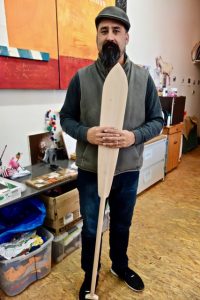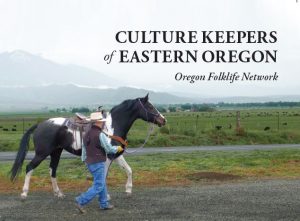In partnership with Oregon’s nine federally recognized Tribes and the Museum of Natural and Cultural History, OFN is producing a series of documentary shorts. We’re pleased to feature one of those videos, which provides a Native perspective on Oregon’s history and shows the ongoing work of cultural conservation and preservation.
Monthly Archives: May 2017
2017 Regional Collaborative Partnership Awards
Makaela Kroin
OFN is pleased to share news about our 2017 Regional Collaborative Partnerships (RCPs). RCPs provide funding for local programs that bring together culture keepers and presenting organizations in regions where OFN has completed fieldwork for our multi-year statewide folklife survey. RCPs foster collaborations between folk and traditional artists and local organizations and also raise awareness about the Oregon Culture Keepers Roster – a programming resource for arts organizations, museums, libraries, parks, schools, and other organizations.
2017’s RCPs targeted the Columbia River Gorge and Northeastern Oregon regions surveyed in 2015. They reflect collaborations with the Columbia Gorge Discovery Center & Museum, Radio Tierra, and Tamástslikt Cultural Institute.
- The Columbia Gorge Discovery Center & Museum is expanding an ongoing initiative to include more Native American voices. The Center will showcase a variety of rostered Native artists, storytellers, and performers for programs throughout the summer.
- Radio Tierra will feature Mariachi Los Temerosos, Pepe y Los Amigos de la Sierra, and the Matthews Family Gospel Singers for Radio Tierra’s live broadcast on July 3, 2017 for the annual Mayors’ Independence Eve Celebration. The towns of Hood River, Bingen, and White Salmon come together each year for this celebration of diversity and community.
- Tamástslikt Cultural Institute will bring culture keepers closely associated with the Confederated Tribes of Umatilla to share stories and songs about Celilo Falls in public program on May 31, 2017 to enhance Tamástslikt Cultural Institute’s exhibit, “Celilo: Progress vs. Protest.”
Funding for these partnerships comes from the National Endowment for the Arts and the Oregon Arts Commission.
OFN Prepares the Next generation of Public Folklorists
Emily Hartlerode
OFN welcomes four Spring interns and volunteers this term. Being situated at a University enables OFN to provide students with valuable professional experience in public folklife research methods and public programming. Please welcome: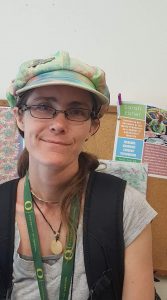
Folklore master’s candidate Sarah Fisher’s internship involves learning about event marketing. Fisher has a research interest in festival productions engineered by performing arts groups. She has volunteered and performed with cultural festival productions since she was 12 years old.
As an OFN intern, Jes Sokolowski (Nonprofit 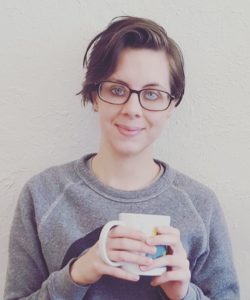 Management master’s candidate) is exploring cultural organization operations and programming. Her research interests are in cultural policy, cultural economics, and the relationship between creativity and risk taking. Her passion for both art and numbers has set her on a mission to create aesthetically pleasing spreadsheets for the numerically averse. Her favorite things include waffles, Marlene Dietrich’s costumes, and board games.
Management master’s candidate) is exploring cultural organization operations and programming. Her research interests are in cultural policy, cultural economics, and the relationship between creativity and risk taking. Her passion for both art and numbers has set her on a mission to create aesthetically pleasing spreadsheets for the numerically averse. Her favorite things include waffles, Marlene Dietrich’s costumes, and board games.
For her OFN internship, Hillary Tully (Folklore master’s candidate) is 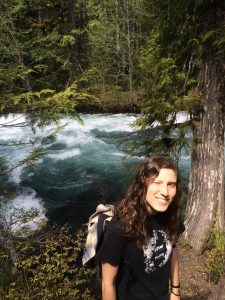 preparing a National Heritage Fellowship nomination. This National Endowment for the Arts award is the highest honor an American folk and traditional artist can achieve. Tully brings her research interest in reproductive health narratives, and a wry sense of humor. She is an “internal zoo of fascinating animal facts,” and also claims to be an unofficial spokesperson for Prego Spaghetti Sauce.
preparing a National Heritage Fellowship nomination. This National Endowment for the Arts award is the highest honor an American folk and traditional artist can achieve. Tully brings her research interest in reproductive health narratives, and a wry sense of humor. She is an “internal zoo of fascinating animal facts,” and also claims to be an unofficial spokesperson for Prego Spaghetti Sauce.
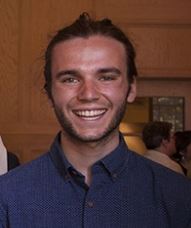 Augustine Beard (Honors College bachelor’s candidate in History and Environmental Science) is volunteering at OFN to learn more about careers in heritage and arts administration. Before coming to the University of Oregon, he was in a rock band for five years and produced two albums. Augustine also was just one of 5 University of Oregon undergraduates to receive a 2017 undergraduate research award for an outstanding paper.
Augustine Beard (Honors College bachelor’s candidate in History and Environmental Science) is volunteering at OFN to learn more about careers in heritage and arts administration. Before coming to the University of Oregon, he was in a rock band for five years and produced two albums. Augustine also was just one of 5 University of Oregon undergraduates to receive a 2017 undergraduate research award for an outstanding paper.
2017 Community Conversation, Vernonia, Oregon
Makaela Kroin
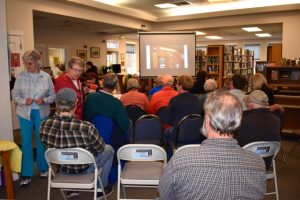 On Tuesday, May 2nd, a crowd of people packed the Vernonia Public Library to join in a community conversation with retired timbermen Don Webb and Fred Heller. The event was one of a series of public presentations that wrapped up OFN’s folklife survey of the Portland Metro Area. Folklorist, Makaela Kroin, launched the conversation asking Webb and
On Tuesday, May 2nd, a crowd of people packed the Vernonia Public Library to join in a community conversation with retired timbermen Don Webb and Fred Heller. The event was one of a series of public presentations that wrapped up OFN’s folklife survey of the Portland Metro Area. Folklorist, Makaela Kroin, launched the conversation asking Webb and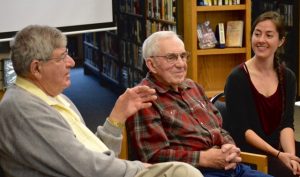 Heller to talk about their families’ long histories in the timber industry. But soon, the multi-generational audience of community members were engaging the men with their own questions. The attendance and enthusiasm at this event demonstrates the deep significance of Vernonia’s logging heritage. Many thanks go to Shannon Romtvedt of the Vernonia Public Library, Scott Laird of the Vernonia Voice, and Tobie Finzel of the Vernonia Pioneer Museum for their support of the program, as well as the National Endowment for the Arts for funding our regional folklife surveys.
Heller to talk about their families’ long histories in the timber industry. But soon, the multi-generational audience of community members were engaging the men with their own questions. The attendance and enthusiasm at this event demonstrates the deep significance of Vernonia’s logging heritage. Many thanks go to Shannon Romtvedt of the Vernonia Public Library, Scott Laird of the Vernonia Voice, and Tobie Finzel of the Vernonia Pioneer Museum for their support of the program, as well as the National Endowment for the Arts for funding our regional folklife surveys.
“PDX Culture Keepers Festival”: Check out our Mini-Festival of Folk Artists and Performers at the Oregon Historical Society
Makaela Kroin
OHS has a festive afternoon planned for June 11th, 2017, 2-4 pm. Five featured Portland Metro Area folk artists will perform or demonstrate a variety of cultural traditions, from traditional Kenyan cooking techniques to Estonian folk dance. Rounding out the program will be interactive demonstrations of Oaxacan weaving, Coquille/Coos canoe paddle carving, and intricately woven nautical rope mats. The featured artists were identified by fieldworkers Nancy Nusz, Douglas Manger, and Makaela Kroin during the 2016 Portland Metro Folklife Survey.
This free, family-friendly open-house event is brought to you by the Oregon Folklife Network and is part of the Oregon Historical Society’s “Second Sunday” series.
Featured artists include:
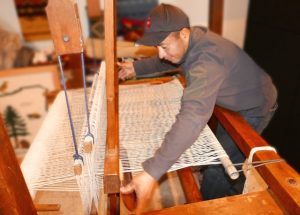 Francisco Bautista is a fourth-generation weaver from Teotitlán del Valle, a village near Oaxaca City, Mexico, known for its weaving tradition. Bautista, who sells his stunning hand-loomed rugs at Portland’s Saturday Market, will show how he weaves colorful designs on his five-foot loom. He’ll also talk about his family’s traditional dyes and their natural sources.
Francisco Bautista is a fourth-generation weaver from Teotitlán del Valle, a village near Oaxaca City, Mexico, known for its weaving tradition. Bautista, who sells his stunning hand-loomed rugs at Portland’s Saturday Market, will show how he weaves colorful designs on his five-foot loom. He’ll also talk about his family’s traditional dyes and their natural sources.
Dennis Best, a retired US Coast Guard Chief Officer and Surfman, travels the world in his sailboat and makes traditional nautical rope mats of manila rope and seine net twine. Best will demonstrate his knotting techniques and invites guests to tie a few themselves.
Wambui Machua, Kenyan chef and business owner, teaches African cooking classes, caters, sells food at markets, and funds charitable projects through her Beaverton-based business, Spice of Africa. Machua will prepare typical Kenyan dishes including ugali, a corn meal based dish, and samosas.
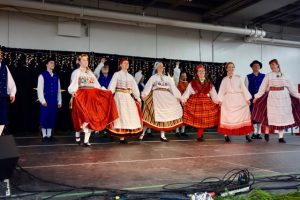 Tulehoidjad, Portland’s Estonian folk dance troupe, has kept the Estonian language, dances, and other Baltic traditions alive for four generations in Oregon. Liina Teose leads the troupe that her mother, Estonian immigrant Lehti Merilo, founded in 1950. Both the adult and youth troupes will perform, and visitors are invited to learn some steps and join in!
Tulehoidjad, Portland’s Estonian folk dance troupe, has kept the Estonian language, dances, and other Baltic traditions alive for four generations in Oregon. Liina Teose leads the troupe that her mother, Estonian immigrant Lehti Merilo, founded in 1950. Both the adult and youth troupes will perform, and visitors are invited to learn some steps and join in!
Shirod Younker (Upper Coquille and Miluk Coos), is one of the keepers of his Tribe’s cultural knowledge. A recipient of the 2017 Native Arts and Culture Foundation’s Mentor Artist Fellowship, he manages the only pre-college artists-in-residence program for Native American teens in the United States. Younker will demonstrate his canoe paddle carving and discuss the interconnectedness between spiritual wisdom and Native art aesthetics.
This event is free and open to the public—all ages are welcome—no registration required. The Oregon Historical Society is located at 1200 SW Park Avenue, Portland, OR 97205.
For more information about the Oregon Historical Society, visit http://www.ohs.org/.
This event is the culmination of the Oregon Folklife Network’s Portland Metro folklife survey, the fourth in a series of regional surveys to identify and document folk and traditional artists in Oregon. The survey was funded by the National Endowment for the Arts, Art Works, Folk & Traditional Arts Program.
OFN is administered by the University of Oregon and is supported in part by grants from the Oregon Cultural Trust, Oregon Arts Commission, and the National Endowment for the Arts.
To join the Twitter conversation about this event, please use #Oregonfolk. For more information on projects included in the NEA grant announcement, go to arts.gov. Follow OFN on Twitter @OregonFolklife and follow us on Facebook at Oregon Folklife Network.
2017 Association of Western States Folklorists Society’s Annual Meeting
Brad McMullen
 From April 20th-22nd, the Oregon Folklife Network hosted the annual Association of Western States Folklorists meeting. This gathering brings together public folklorists throughout the American West to discuss their current work and learn new skills. This year was especially exciting because the Western States Folklore Society (WSFS) also had its annual conference in Eugene, a planned convergence that encouraged public and academic folklorists to come together and share ideas.
From April 20th-22nd, the Oregon Folklife Network hosted the annual Association of Western States Folklorists meeting. This gathering brings together public folklorists throughout the American West to discuss their current work and learn new skills. This year was especially exciting because the Western States Folklore Society (WSFS) also had its annual conference in Eugene, a planned convergence that encouraged public and academic folklorists to come together and share ideas.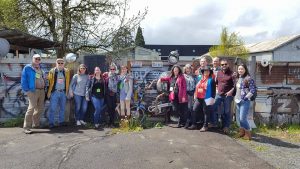
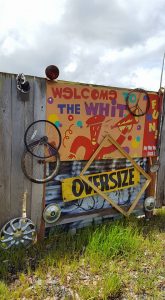 AWSF kicked off with a cultural heritage tour of Eugene’s Whiteaker neighborhood. The tour was loosely organized around the impacts of gentrification for community arts and craft businesses and
AWSF kicked off with a cultural heritage tour of Eugene’s Whiteaker neighborhood. The tour was loosely organized around the impacts of gentrification for community arts and craft businesses and  residents. At Falling Sky Delicatessen, the group enjoyed generous and delicious tastes of and tips about fermented foods. Chair of the Whiteaker Community Council, Sam Hahn, led folks on walking tour of the
residents. At Falling Sky Delicatessen, the group enjoyed generous and delicious tastes of and tips about fermented foods. Chair of the Whiteaker Community Council, Sam Hahn, led folks on walking tour of the  neighborhood and visit to Blairally Vintage Arcade, where our visiting folklorists learned about pinball culture and the restoration of old pinball
neighborhood and visit to Blairally Vintage Arcade, where our visiting folklorists learned about pinball culture and the restoration of old pinball 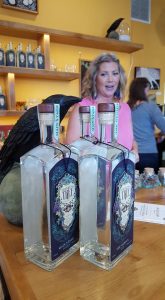 machines. Next, the group popped in to Thinking Tree Spirits, a newly opened distillery where a tour of the distillation facilities and samples of craft vodka and gin cocktails were on
machines. Next, the group popped in to Thinking Tree Spirits, a newly opened distillery where a tour of the distillation facilities and samples of craft vodka and gin cocktails were on 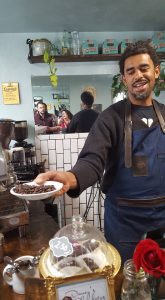 the menu. A visit with Equiano Coffee’s owner/coffee roaster, Okon Udosenata, provided an insider’s view of artisanal coffee roasting plus some aromatic sips
the menu. A visit with Equiano Coffee’s owner/coffee roaster, Okon Udosenata, provided an insider’s view of artisanal coffee roasting plus some aromatic sips  Chris Paulson’s fused glass studio entranced everyone with its beautiful displays and Paulson’s stories about his work. Our final stop was at Ninkasi Brewing, where the group learned about the “brewshed” and Ninkasi’s history in the Whiteaker neighborhood.
Chris Paulson’s fused glass studio entranced everyone with its beautiful displays and Paulson’s stories about his work. Our final stop was at Ninkasi Brewing, where the group learned about the “brewshed” and Ninkasi’s history in the Whiteaker neighborhood.
Our joint AWSF and WSFS conferences came together at the start with a memorial screening of Carol Spellman’s For the Love of the Tune: Irish Women and Traditional Music and moving tributes to Carol and her work. Next on the agenda was a joint session on the Future of Folklore, which OFN executive director, Riki Saltzman, facilitated. With speakers from as far as American Folklife Center in Washington D.C., and as local as Native storyteller Patricia Whereat Phillips, the panel discussed where the field of folklore is going and how to best prepare folklorists for the future. After lunch, a panel of alumni from the University of Oregon’s Folklore graduate program shared ways in which they applied their folklore skills in a variety of workplace settings. Attendees were happy to see how people are both engaging with and expanding the field of folklore. UO librarian Nathan Georgitis provided an overview of best practices and a rundown of useful tools for managing a folklore archive.
 Highlights from the final day of the conference included Shirod Younker (Coquille/Miluk Coos), who provided an in-depth and engaging presentation on Native perspectives on and contemporary programming in traditional arts. Younker also shared some of his own art and spoke about his involvement with the A. Susana Santos’ Journeys in Creativity Program at Oregon College of Art and Craft. In another session, OFN’s Lyle Murphy and Indiana University’s Kelly Totten discussed their work with incarcerated populations. AWSF closed with Bodeene Amyot’s workshop on photographic skills, which was filled with great examples and tips for how to best use your camera to take fantastic photographs. Amyot is a gifted photographer and visual storyteller.
Highlights from the final day of the conference included Shirod Younker (Coquille/Miluk Coos), who provided an in-depth and engaging presentation on Native perspectives on and contemporary programming in traditional arts. Younker also shared some of his own art and spoke about his involvement with the A. Susana Santos’ Journeys in Creativity Program at Oregon College of Art and Craft. In another session, OFN’s Lyle Murphy and Indiana University’s Kelly Totten discussed their work with incarcerated populations. AWSF closed with Bodeene Amyot’s workshop on photographic skills, which was filled with great examples and tips for how to best use your camera to take fantastic photographs. Amyot is a gifted photographer and visual storyteller.
The meeting created critical time for folklorists to engage with each other on projects and issues all share in common and to strategize about growth and sustainability in our field. OFN is grateful for funding from UO’s Academic Affairs and the UO Folklore Program as well as the American Folklore Society’s Professional Award.
Books! Books! OFN New Releases
Alina Mansfield
We are pleased to announce the release of Oregon Folklife Network’s first publication: Culture Keepers of Eastern Oregon. In the Spring of 2016, Folklorists Douglas Manger and Joseph O’Connell visited communities throughout the Eastern Oregon region and interviewed cowboys, ranchers, quilters, water witchers, stone masons, old time musicians, community poets, fly tiers, fishing guides and more. This folklife survey into the “deep west” of Eastern Oregon, was made possible thanks to generous funding from the National Endowment for the Arts, Art Works, and the Oregon Historical Society.
Culture Keepers of Eastern Oregon features over 40 photographs and biographies of traditional artists throughout the Eastern Oregon counties of Baker, Crook, Deschutes, Grant, Union, Wallowa, and Wheeler. Douglas Manger explains, “Our effort was to record unique culture keepers at their home place, particularly those held in close esteem for the craft they are upholding, their striving for excellence, their giving back while teaching others.” Joseph O’Connell notes, “Our conversations explored how broad traditions, like rodeo sports or cowboy poetry, take on new dimensions in local places.”
Keep an eye out this summer for our upcoming publication, Oregon Traditional Arts Apprenticeship Master Artists: 2012-2016, which will highlight the 23 master artist teams who received TAAP awards from 2012-2016. This photo essay provides a tantalizing glimpse into Oregon’s cultural traditions and the artists who make them thrive.



